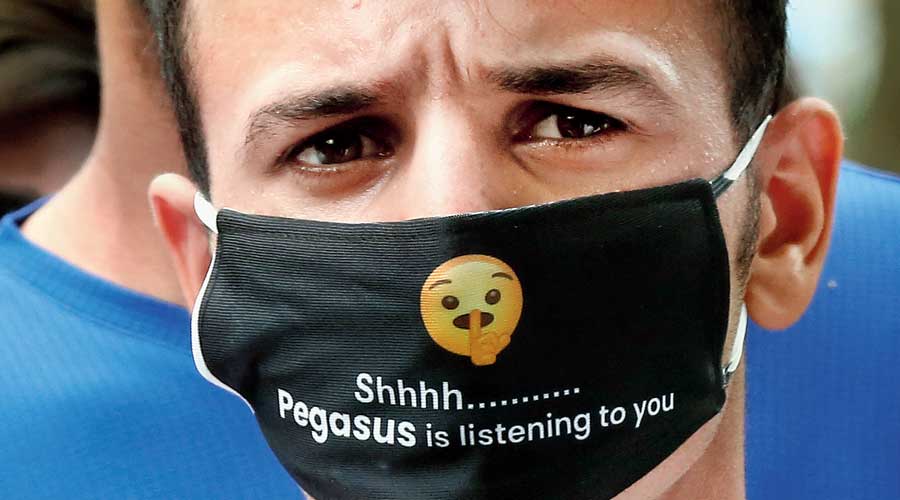Even though instances of snooping erupt into the public consciousness occasionally, they are pervasive in the modern world. States that do not spy on other States are deemed quixotic. Snooping on citizens, if done by the State, follows the same logic. The Pegasus snoopgate, thus, has nuances that merit attention, which can help contrast snooping with dialogue. Snooping is the other half of dialogue, laden with secretive insidiousness.
To snoop is to know the other. But snooping is not the only mode for this. Dialogue and debates were its predecessors. Their essence was mutuality. Both were means to know the truth. This is why grounding a student in rhetoric was considered basic to education in ancient Greece and, later, Europe. The education of a gentleman was incomplete without a schooling in rhetoric — the art of persuasion based on reason and mutual respect. Knowing the other is key to persuading him or her. Respect for mutuality underlies dialogue and debate.
Reciprocity or mutuality underlies contracts of all kinds. The moment one of the parties in the contract begins to act unilaterally, the contract becomes infructuous. The State, being the product of a ‘social contract’ by the citizens, is bound by the accountability that stems from mutuality. Mutuality is the discipline of treating others as one would like to be treated. Power, which operates unilaterally, unsettles this balance. Power is nothing, if it cannot be exercised arbitrarily and unilaterally. The State has the right to use force; citizens do not. The State must be heard; but does not have the duty to listen. Power in the abstract is incorruptible. It succumbs to corruption when, in being concretized, it is infected with unilateralism. Power corrupts, and absolute power absolutely, only when it is exercised in this way. Unilateralism characterizes all unethical instincts and practices. Corruption is a unilateral action.
The goal of snooping is to know the other. But it is not to know the other as a fellow human being, but as a lurking enemy. Here, the object of knowledge is pre-judged. Snooping formats ‘otherness’ in prejudice. The worrisome thing is not that snooping happens; but that a scheme of things, a political culture, exists in which snooping becomes necessary. Snooping is a symptom, not the disease.
The disease is the erosion of the trust and reciprocity between the ruler and the ruled. It is simplistic to see the targets of snooping as a handful of individuals. They are snooped on because of the chunk of national reality they represent. They are dangerous, in so far as they represent and articulate the ruptured other half of reality, the invocation of which is presumed destabilizing. They are the ‘against-the-motion’ ruckus of the debate, so to speak. In a wholesome climate of opinion, the against-the-motion voice has its place, as hearing the other side is vital to seeing the given issue in truth, clearly and comprehensively. Snooping seeks to know the given reality unilaterally. It aims at a surreptitious half-dialogue with the other as a target, unknown to them and in hostility. It encapsulates the oxymoron of sniffing the truth, without any regard for truth as such.
The State being an embodiment of power, the temptation to deal with citizens unilaterally is second nature to it. Hence the need to put in place effective checks and balances. Democracy is the best mode of governance, only in so far as it abides by the reciprocity between the ruler and the ruled. Accountability is a function of reciprocity. Dictatorship excludes it, because in it power is unbridled by reciprocity. Democracy is imperilled when the mutuality between the State and citizens is compromised.
Consider an analogous situation to see this for what it is: the dynamics of people’s representation in a democracy. In a healthy democracy, there is meaningful reciprocity between the people and the representatives they elect. But this is not the case at present. Reciprocity exists now only between voters and candidates. It evaporates once candidates become elected representatives. This can be remedied, to an extent, by granting citizens the right to recall their representatives, if and when they betray the trust reposed in them.
The unilateralism that snooping symbolizes has widely metastasized into our public life. It is inadequate, therefore, to see snooping only as an intrusion into personal privacy. What is the idea of ‘privacy’ implied in this view? Can privacy be a barriered space in which individuals act unilaterally; especially, if the consequences thereof spill into the public domain? The seminal issue in snooping is not that privacy is breached — admittedly this happens — but that unilateralism has become the character of life today.
Unilateralism is an anti-life pattern. Life is a ceaseless back-and-forth flow. If a way of life is erected on unilateralism, there will be either the systole or the diastole of life; not the circulation of blood that sustains life. Unilateralism is the death-principle. Death is a one-way street. The dead go only one way: to the grave. Aside from differences in degree and nuances, all unilateral actions are death-dealing. In snooping, death kisses life; falsehood peeks through the keyhole of mistrust into the zone of unguarded vulnerability.










